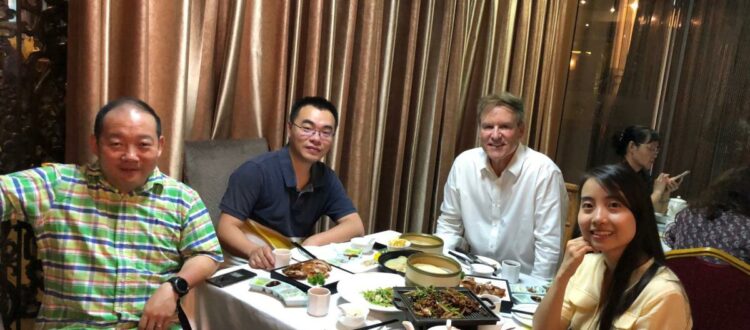Sharing the Gospel: Teaching English in China
This was my first time to Asia–Beijing, China. I thought it would be an easy trip. After all, I had been to the Democratic Republic of the Congo four times preaching and teaching in the jungles, large cities, villages and even on a 13-hour boat ride from the north to the south side of Lake Kivu, one of Africa’s great lakes. This trip would be challenging–but on a different level.

Invited to teach at a Beijing university through a combined effort with University administrators and China Academic Consortium/Educational Resources Referrals China, an evangelical missions organization located in Oakland, California, I taught students daily for two weeks. These were doctoral students who had as one of their required courses oral and writing skills of English; they had studied and used English for many years as the students were older, but they needed to fine-tune their understanding and use of the language.
They were absolutely brilliant as students and, as persons, models of the best of Chinese character and decorum. They insisted that I go to meals with them after class and even several times during the week for dinner. A new food for me is Peking duck along with several other dishes which I still am not certain exactly what they were, but they were wonderful. It was embarrassing not to be able use chop sticks at first; I was even told several times that perhaps I should use a fork. But I persisted and now am at least average in my use of them. I will use the fan they gave me which has on it the name of each student.

When it comes to tea, the Chinese truly have it going. They explained to me that there are at least six different kinds of tea, and each one must be prepared carefully according to long-practiced steeping traditions in order to savor meaningfully the distinct tastes of each kind. They thought it was especially forbidden to sweeten the tea as that would take away from the experience of meaningful tea imbibing. Also, they drink hot water, not cold, with their meals, and the explanation was that cold water was not good for digestion. In retrospect, I do not recall seeing one obese Chinese person.
In the Beijing area are located some fabulous sites: The Temple of Heaven, The Summer Palace and of course–The Great Wall of China. As a westerner, all three gave me a greater understanding of the magnificence of Chinese culture and history. The Forbidden City is also there, and perhaps next time I will be able to see this structure.
Walking was my primary means of transportation though I did take subways several times. Small electric bikes are everywhere! One must take care to look all around as much as possible since the bikes make no noise and they will whiz past you; if not careful, one could step in the path of one. Ladies use an umbrella since light skin is seen as most favorable and anything to keep the sun from causing a burn or tan is embraced. The air quality could be better, though has improved over the past two years, and many wear masks.

I was informed many times before I went and while there that the mentioning of religion would not be tolerated. It was also strongly stated that I should not talk about politics or events such as Tiananmen Square. My class was monitored by several cameras and Communist Party members who would sit in on my class to determine if any violations had occurred. Many of the students are also party members; they told me that there are many benefits of such membership. I must have passed the tests because I was asked to come back again next year! However, as a minister of the Gospel, my heart ached for the students in particular who had embraced atheism.
A few of them confided to me that life is full of stress and anxiety and that they are not certain of what a fully meaningful life would be. They cited the usual atheistic line that one is to make the best of this life and that there is nothing after death. They said that they fill the void in their lives with education, work and family. I trust that I was able, along with the three other teachers, to plant seeds and that the nurturing of the awareness of Christ will eventually take place in their lives.

We attended a state-sanctioned church, and I was able to converse with Pastor Wu after one of the services. He is in a difficult situation since members of the underground Church would view a state-sanctioned Church as a compromise, not really true to the Gospel and serving the state over Christ. His service was lively, well-attended and centered on the Gospel.
My three weeks in China were most meaningful. They are absolutely a delightful people. Pray for the Church in China!


